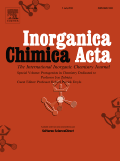
INORGANICA CHIMICA ACTA
metrics 2024
Connecting Scholars through High-Impact Research
Introduction
INORGANICA CHIMICA ACTA is a distinguished journal published by Elsevier Science SA, focusing on the dynamic fields of inorganic chemistry, materials chemistry, and physical and theoretical chemistry. Established in 1967, the journal continues to contribute to the scientific community with a commitment to high-quality research and innovation, boasting a 2023 Scopus ranking that places it at the forefront of its category, including a notable rank of #25 out of 79 in Inorganic Chemistry. Researchers can access a wealth of knowledge through its assemblage of influential articles; though it does not offer open access, the journal remains a key resource in the Netherlands and beyond. With an impact factor reflective of its rigorous editorial standards and engagement, INORGANICA CHIMICA ACTA is essential for scholars and professionals seeking to deepen their understanding and advance their research in these interconnected scientific domains.
Metrics 2024
 0.39
0.39 2.70
2.70 2.10
2.10 108
108Metrics History
Rank 2024
Scopus
IF (Web Of Science)
JCI (Web Of Science)
Quartile History
Similar Journals

CHINESE JOURNAL OF STRUCTURAL CHEMISTRY
Illuminating Trends in Molecular DesignThe CHINESE JOURNAL OF STRUCTURAL CHEMISTRY, published by Elsevier, stands as a vital resource in the field of structural chemistry, notably contributing to the advancement of knowledge since its inception in 1996. With its ISSN 0254-5861 and E-ISSN 0254-5861, the journal has established a firm reputation, garnering a Q2 ranking in the 2023 Chemistry (miscellaneous) category, which highlights its influence in the academic community (rank #155/408, 62nd percentile in Scopus). This journal serves as an invaluable platform for researchers and professionals by disseminating high-quality research findings, theoretical studies, and applied methodologies that address both fundamental aspects and emerging trends in structural chemistry. With contributions from distinguished scholars, it aims to foster innovation and collaboration, while providing a space for novel discoveries in the field. Although it does not currently offer Open Access, its robust content continues to attract a diverse readership eager to engage with cutting-edge scientific developments.
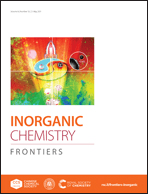
Inorganic Chemistry Frontiers
Exploring New Frontiers in Inorganic ChemistryInorganic Chemistry Frontiers, published by the esteemed Royal Society of Chemistry, stands at the forefront of advancements in the field of inorganic chemistry, boasting a prestigious Q1 ranking in its category as of 2023 and an impressive Scopus Rank of #3 out of 79, placing it in the 96th percentile. Since its inception in 2014, this journal has provided a robust platform for high-quality research that spans the diverse and rapidly evolving areas of inorganic chemistry. As an open-access journal, it ensures that the findings presented are readily accessible to researchers, educators, and practitioners globally, fostering an inclusive environment for the dissemination of knowledge. With its rigorous peer-review process, Inorganic Chemistry Frontiers aims to facilitate interdisciplinary dialogue and innovation, making it an essential resource for anyone dedicated to exploring the myriad applications and theoretical advancements within inorganic chemistry.
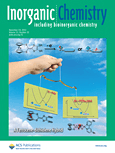
INORGANIC CHEMISTRY
Fostering Excellence in Inorganic Chemistry ScholarshipInorganic Chemistry, published by the American Chemical Society, stands at the forefront of the field of inorganic and physical chemistry, boasting an impressive impact in the academic community with a 2023 classification in the Q1 quartile across multiple categories including Inorganic Chemistry and Miscellaneous Chemistry. Since its inception in 1962, this esteemed journal has been a crucial platform for disseminating groundbreaking research, innovative methodologies, and comprehensive reviews integral to understanding the complex behaviors of inorganic materials. With a ranking of #12 out of 79 in Inorganic Chemistry and #37 out of 189 in Physical and Theoretical Chemistry according to Scopus metrics, Inorganic Chemistry has established itself as a premier destination for researchers, professionals, and students alike, eager to stay abreast of pivotal developments and trends in the discipline. Despite being a subscription-based journal, its esteemed reputation and critical contributions make it essential for anyone engaged in the exploration of inorganic chemical phenomena. As it prepares to converge into a new era by 2024, the journal continues to embody excellence and innovation, fostering a dynamic exchange of ideas essential for advancing this vibrant area of science.
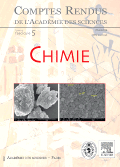
COMPTES RENDUS CHIMIE
Fostering Global Collaboration in Chemical Sciences.COMPTES RENDUS CHIMIE, published by the prestigious Académie des Sciences in France, stands as a significant journal in the fields of chemistry and chemical engineering. With an ISSN of 1631-0748 and an E-ISSN of 1878-1543, this open-access journal has been committed to disseminating high-quality research since its transition to open access in 2020. Featuring a diverse array of studies, the journal covers innovative research trends and applications, while maintaining a Q3 category ranking in both Chemical Engineering (miscellaneous) and Chemistry (miscellaneous) as of 2023. Its Scopus rankings, positioning at #251 out of 408 in general chemistry and #169 out of 273 in general chemical engineering, highlight its growing impact within the scientific community. Authored by a global cohort of scientists and researchers, COMPTES RENDUS CHIMIE is dedicated to the advancement of knowledge and sharing insights that are vital for ongoing research and development in the chemical sciences. Located in the heart of Paris at 23 Quai de Conti, 75006, France, the journal is an essential resource for those passionate about chemistry and engineering disciplines, fostering collaboration and innovation across the world.
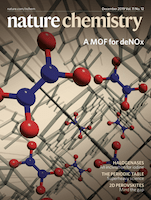
Nature Chemistry
Pioneering Research in Chemistry and Engineering.Nature Chemistry is a prestigious journal published by NATURE PORTFOLIO, focusing on groundbreaking research in the realms of chemistry and chemical engineering. Since its inception in 2009, this esteemed publication has garnered significant recognition, currently ranking in the Q1 category for both Chemical Engineering and Chemistry (miscellaneous) as of 2023. With an impactful presence, it ranks 4th out of 273 in General Chemical Engineering and 9th out of 408 in General Chemistry, placing it within the top 2% of journals in its field. Nature Chemistry aims to publish high-quality, peer-reviewed articles that advance our understanding of chemical science and its applications, catering to an audience of researchers, professionals, and students eager to explore innovative discoveries. While it offers various access options, dedicated readers appreciate its contribution to the scientific community from its base in Berlin, Germany.

TRANSITION METAL CHEMISTRY
Unraveling the Complexities of Metals and AlloysTransition Metal Chemistry is a distinguished journal published by Springer, focusing on the latest advancements in the field of inorganic chemistry, materials science, and metals and alloys. With an impressive publication history dating back to 1975, this journal serves as an essential platform for researchers and professionals seeking to explore the complexities and innovations in transition metal chemistry. Transition Metal Chemistry holds a Q4 ranking in Inorganic Chemistry and positions itself in Q3 within both Materials Chemistry and Metals and Alloys categories, highlighting its evolving influence in these domains. With a Scopus ranking of #41 in Inorganic Chemistry and #56 in Materials Science, it provides readers with valuable insights into research trends and discoveries. Although it does not offer open access, its rigorous peer-review process ensures that only the most impactful and validated studies are published. By bridging theoretical concepts and practical applications, Transition Metal Chemistry plays a pivotal role in advancing scientific knowledge, attracting a diverse audience of researchers, students, and industry professionals committed to unraveling the complexities of transition metals.

JOURNAL OF THE INDIAN CHEMICAL SOCIETY
Empowering Chemists through High-Quality ResearchJournal of the Indian Chemical Society, published by Elsevier, stands as a cornerstone in the field of chemistry, particularly representing the rich chemical research emanating from India.
With a significant history dating back to its establishment, this journal encompasses diverse disciplines including Drug Discovery, Electrochemistry, Inorganic Chemistry, Organic Chemistry, and Physical and Theoretical Chemistry, reflecting the evolving landscape of chemical sciences.
Despite being positioned in the Q3 category across multiple quarters, the journal demonstrates promising rankings in various chemistries, highlighting its commitment to advancing the knowledge and application of chemical sciences. While currently not available as an open access journal, the Journal of the Indian Chemical Society is dedicated to providing a platform for high-quality research that fosters innovation and collaboration among researchers, professionals, and students worldwide.
With its continuous publication from 1973 to the present, it serves as an essential repository for cutting-edge findings and developments in chemistry, striving to connect academia with industry and practice.
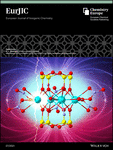
EUROPEAN JOURNAL OF INORGANIC CHEMISTRY
Unveiling New Horizons in Inorganic ChemistryThe EUROPEAN JOURNAL OF INORGANIC CHEMISTRY, published by WILEY-V C H VERLAG GMBH, is a premier peer-reviewed journal dedicated to advancing the field of inorganic chemistry. With an ISSN of 1434-1948 and an E-ISSN of 1099-0682, this journal has established itself as a key platform for the dissemination of innovative research, reviews, and features since its inception. As of 2023, it holds a respectable Q2 quartile ranking in the domain of inorganic chemistry, reflecting its influence and contribution to the scientific community—ranking #33 out of 79 in Scopus’ assessment and placing the journal in the 58th percentile. The journal encompasses a wide range of topics within inorganic chemistry, making it a valuable resource for researchers, professionals, and students alike. Although the journal does not currently offer open access, it remains an essential outlet for high-quality, impactful studies in inorganic chemistry, showcasing significant advancements and fostering collaboration among scholars globally.
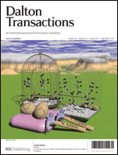
DALTON TRANSACTIONS
Advancing the Frontiers of Inorganic ChemistryDALTON TRANSACTIONS, published by the esteemed Royal Society of Chemistry, is a premier journal in the field of Inorganic Chemistry, recognized for its significant contributions to advancing research and scholarship since its inception in 2002. With an impressive Impact Factor and ranked in the Q1 category, it holds a notable position at Rank #21 out of 79 within its Scopus category, highlighting its reputation for excellence and influence in the scientific community. This journal provides a platform for disseminating high-quality research, reviews, and communications related to all aspects of inorganic chemistry, fostering collaboration and innovation among researchers, professionals, and students alike. Although it does not offer open access, its robust selection process and commitment to scholarly integrity ensure that published works are of the highest standard. For those passionate about inorganic chemistry, DALTON TRANSACTIONS serves as an essential resource, fostering a deeper understanding of the field and its applications.
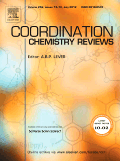
COORDINATION CHEMISTRY REVIEWS
Exploring the Frontiers of Coordination ChemistryCOORDINATION CHEMISTRY REVIEWS is a premier academic journal published by ELSEVIER SCIENCE SA, specializing in the interdisciplinary field of coordination chemistry. Established in 1966 and running until 2025, the journal boasts an impressive reputation, having achieved Q1 quartile rankings in categories such as Inorganic Chemistry, Materials Chemistry, and Physical and Theoretical Chemistry. It holds a remarkable position in Scopus rankings, being ranked #1 in both Physical and Theoretical Chemistry and Inorganic Chemistry, indicating its significance within the field. With a focus on comprehensive reviews that synthesize existing knowledge and propose future research directions, COORDINATION CHEMISTRY REVIEWS serves as an invaluable resource for researchers, professionals, and students eager to stay at the forefront of coordination chemistry advancements. Although not open access, the journal is accessible through various academic institutions and libraries, ensuring that cutting-edge research is available to those who seek it.